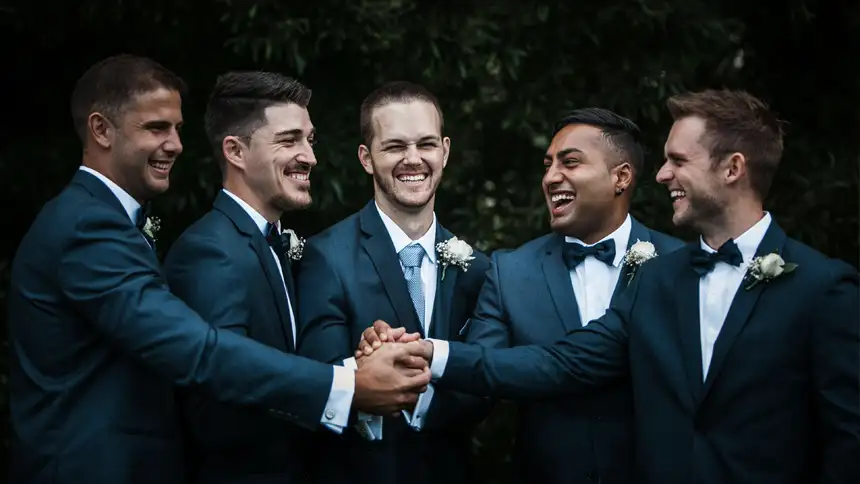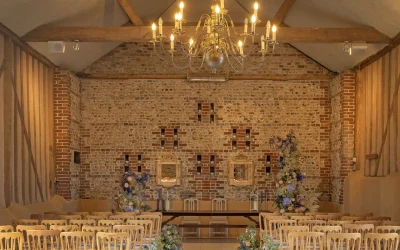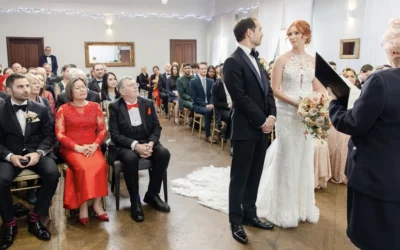Essential Guide to Wedding Ushers and Their Duties: Ensuring a Smooth Ceremony
If you’re planning a wedding, you’ll want to know: what exactly does a wedding usher do? This guide demystifies the critical but often overlooked job of wedding ushers and their duties. From greeting guests with a warm welcome to managing seating logistics, ushering latecomers discreetly, and even responding to unforeseen events, ushers do more than just “show you to your seat.” They are key to ensuring a smooth and well-organized wedding ceremony. Read on to uncover the full spectrum of their responsibilities and the pivotal role they play in making a couple’s big day memorable for all the right reasons.
Key Takeaways
- Wedding ushers are crucial for creating a welcoming atmosphere, managing seating arrangements, and handling unexpected situations to ensure the ceremony runs smoothly.
- Ushers’ duties span from pre-ceremony preparations to post-ceremony activities, requiring them to be informed, organised, and flexible to maintain the event’s flow and guest comfort.
- The ideal number of ushers is based on the size of the guest list and venue layout, commonly one usher per 50 guests, and their attire should match the wedding’s formality and aesthetic.
The Integral Role of Wedding Ushers
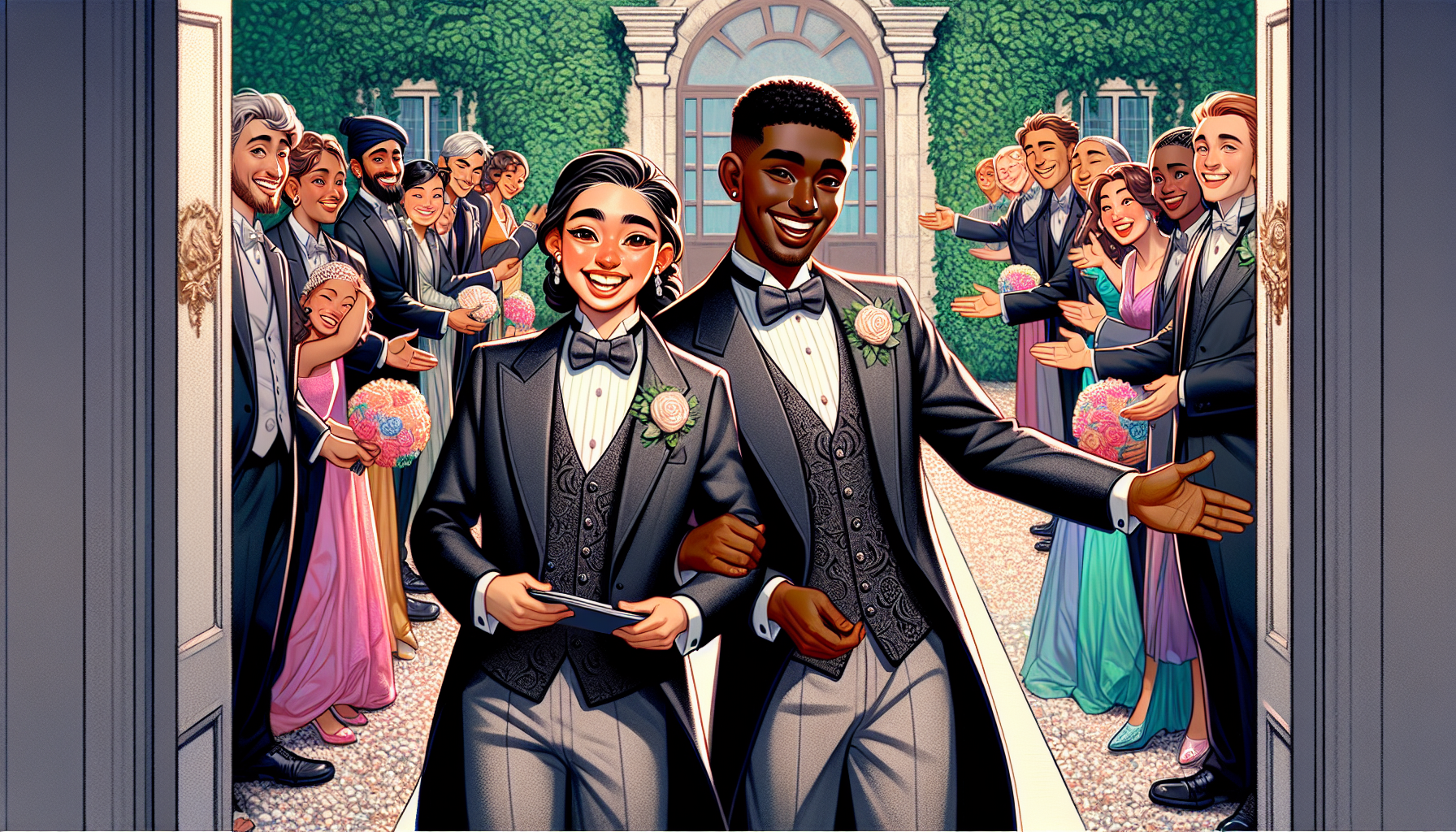
Amid the flurry of floral arrangements and the echo of wedding bells, wedding ushers serve as a cornerstone of ceremony success. Their quintessential duties involve making every attendee feel welcomed and valued. As a wedding usher, they greet, guide, and care for each guest from the moment they arrive at the wedding venue.
Ushers play a pivotal role in orchestrating a day that’s as seamless as it is sentimental. Beyond merely showing guests to their seats, they set the stage for a wedding day filled with warmth and elegant organization.
Warm Welcomes: How Ushers Greet Guests
Picture this: stepping into a venue and being greeted by a smile so genuine, it rivals the joy of the occasion. This is the warmth and positivity that wedding ushers are known for, establishing a positive tone right from the start. With cheerfulness and hospitality, ushers are the front-line facilitators of a memorable experience, handing out orders of service and fielding questions with the finesse of seasoned hosts.
Ushers embody the essence of hospitality, whether they are guiding walking guests to their seats, managing crowd flow, or serving as a source of information.
Seating Arrangements: Where Ushers Seat Guests
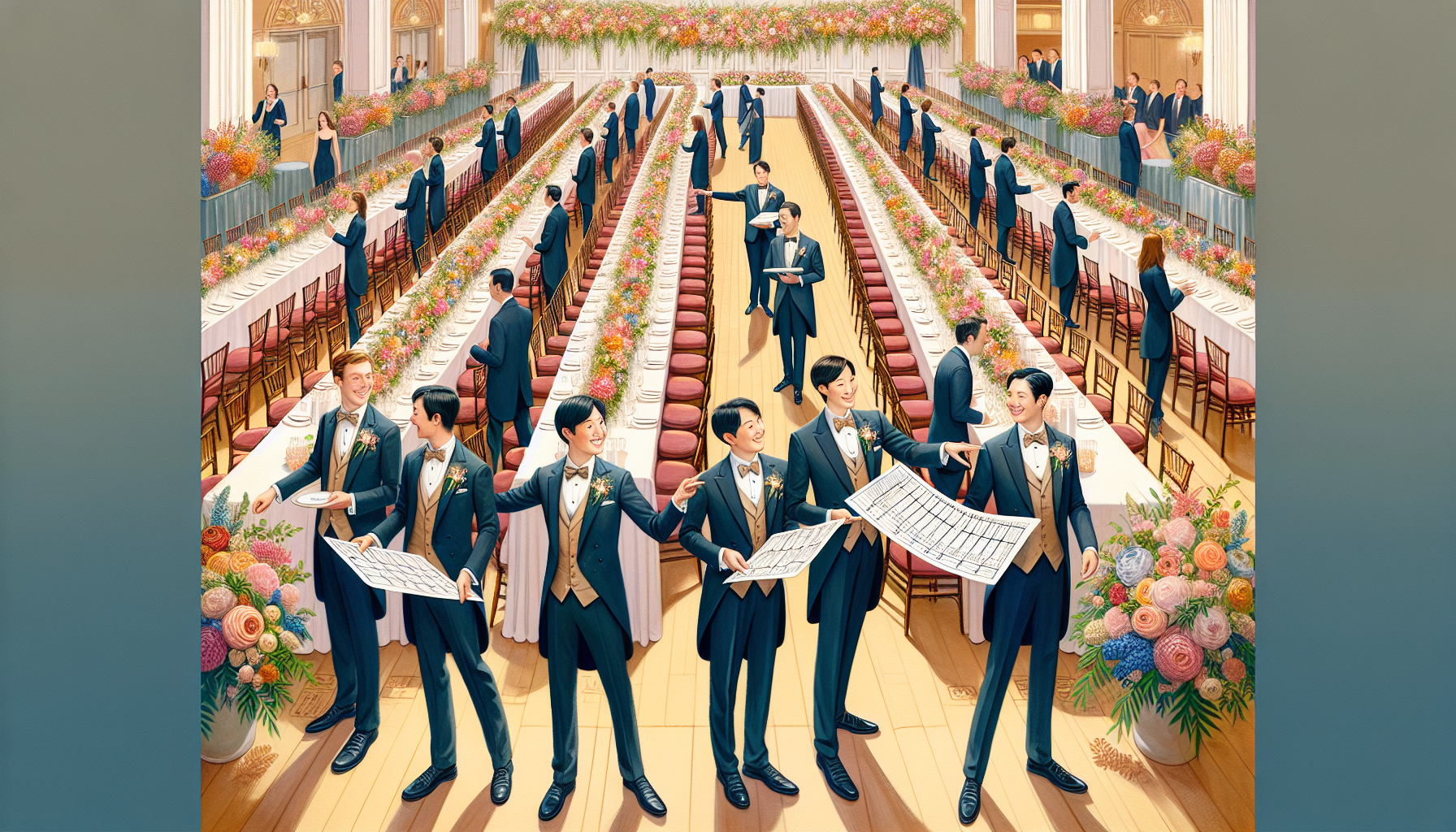
Wedding seating is more than merely finding a spot to watch the vows; it’s a nuanced dance of respect, tradition, and practicality. Ushers choreograph this dance, ensuring VIPs and close family members are honoured with front-row seats reserved exclusively for them. They’re the knowledgeable navigators of the seating plan, placing each guest with thoughtful precision to maintain harmony and balance throughout the venue.
Skilled in the art of filling a space efficiently, ushers:
- guide guests to middle seats
- manage an even distribution that avoids the visual awkwardness of a back-loaded room
- accommodate reserved seating needs
- make everyone from parents to toddlers feel comfortably situated for the ceremony ahead.
They are the unsung heroes.
Handling the Unexpected: Ushers’ Role With Late Arrivals
Even the most meticulously organized plans can encounter unforeseen hiccups. Ushers excel in these situations, skillfully minimizing disruptions by discreetly seating latecomers. With grace and discretion, they ensure that the ceremony’s sanctity remains unbroken, all while keeping the focus on the couple’s special moment.
Ushers’ ability to manage unexpected situations with grace is a gift to the bride and groom, ensuring an uninterrupted exchange of vows.
Decoding Usher Duties Before, During, and After the Ceremony
Transitioning smoothly from one phase of the wedding to the next, ushers keep the day cohesive. From the initial planning stages to the final guest departure, ushers ensure each step is executed with purpose and poise. They’re the guardians of the guest experience, the calm in the chaos, and the diplomats of decorum.
With their support, the wedding planning process ensures that the wedding ceremony becomes a symphony of well-timed movements and joyful encounters, free from the distractions of logistical snags and seating snafus.
Pre-Ceremony Preparation
Before the wedding march begins, ushers lay the groundwork for a perfect day. They transform an empty space into a romantic setting during pre-ceremony preparations, complete with signs and ceremonial materials. They are the welcoming committee, greeting early arrivals and providing guidance from parking spots to pew seats.
Armed with wedding programs and knowledge of venue-specific rules, ushers are the informed insiders who can sprinkle the magic of clarity over any confusion that may arise among guests.
In-Ceremony Support
As the ceremony progresses, ushers have several important responsibilities:
- Ensuring guests are comfortably seated
- Balancing the seating arrangements
- Guiding guests to their seats
- Providing extra assistance to those with special needs
- Maintaining the ceremony’s aesthetic and functional harmony
- Managing late arrivals
- Keeping the photographers’ lines of sight clear
These tasks require the ushers to have an eye on the clock and a hand ready to help.
And when the couple has finally tied the knot, it’s the ushers who lead the bridesmaids gracefully out of the venue, marking the end of their in-ceremony role and the beginning of their post-ceremony responsibilities.
Post-Ceremony Activities
Once the vows have been exchanged and applause fades, ushers guide the newly formed congregation towards the reception, leaving no guest behind. They partake in the post-ceremony festivities, escorting bridesmaids and adding to the celebratory atmosphere that’s captured in photos and memories alike.
As the day winds down, ushers take on the role of caretakers, performing tasks such as:
- Tidying up the venue
- Overseeing the return of any hired items, from suits to centrepieces
- Rounding up guests for group shots, ensuring that everyone gets a moment in the limelight before the day is done.
Selecting Your Squad: Who to Choose as Your Wedding Ushers
Consider assembling your usher squad as if you’re forming a team of superheroes, whose superpowers include friendliness, organization, and responsibility. These are the qualities that make an usher not just good, but great. Ushers can be anyone from neighbours to coworkers, offering a way to honour those significant in your life by giving them a role in your big day.
Whether they’re teenage siblings or long-time family friends, ushers bring a mix of personalities and talents to the wedding, enriching the ceremony with their unique contributions.
Criteria for Choosing Ushers
The criteria for choosing ushers go beyond mere acquaintance; it requires a keen eye for those who naturally exude amiability, are adept at organizing, and have a track record of reliability. Don’t overlook the younger crowd either; outgoing and confident older children often make excellent ushers, charming guests with their youthful enthusiasm and eagerness to help.
Balancing Relationships and Responsibilities
Selecting ushers is a delicate balance of honouring relationships while also ensuring the responsibilities of the role can be met. It’s vital to convey the expectations clearly before extending the invitation, as this allows potential ushers to assess their willingness and ability to perform the tasks at hand. Some of the tasks that ushers may be responsible for include:
- Coordinating with vendors
- Aiding guests with special requirements
- Assisting with seating arrangements
- Distributing programs or other materials
- Directing guests to restrooms or other facilities
By clearly communicating these expectations, you can ensure that your ushers are prepared and capable of fulfilling their roles effectively.
How Many Ushers Should You Have at Your Wedding?
The number of ushers you need for your wedding goes beyond just involving friends; it’s a logistical decision crucial for ensuring a smooth ceremony. A good rule of thumb is to have one usher for every 50 wedding guests, ensuring no one is left wandering or wondering where to go. However, factors like guest list size and venue layout play a significant role in determining whether you’ll need just a few trusted individuals or a whole team of ushers to keep things running smoothly.
Assessing Your Guest List Size
Your guest list size is a prime determinant of usher quantity. A larger turnout may require additional ushers to accommodate the influx of attendees and ensure swift and accurate seating. The one usher per 50 guests guideline is a starting point, but as the list grows, so may your usher count.
Considering the Venue Layout
The second piece of the usher puzzle is the venue layout. Complex venues with multiple entry points or large, sprawling spaces might call for a higher usher-to-guest ratio to keep everyone on the right path. The more intricate the layout, the more ushers you’ll need to ensure no guest is left stranded or seating sections are neglected.
It’s about getting the details right, from the moment your guests arrive to the idiosyncrasies of the venue itself, considering the expected arrival pattern.
What Should Ushers Wear on the Big Day?
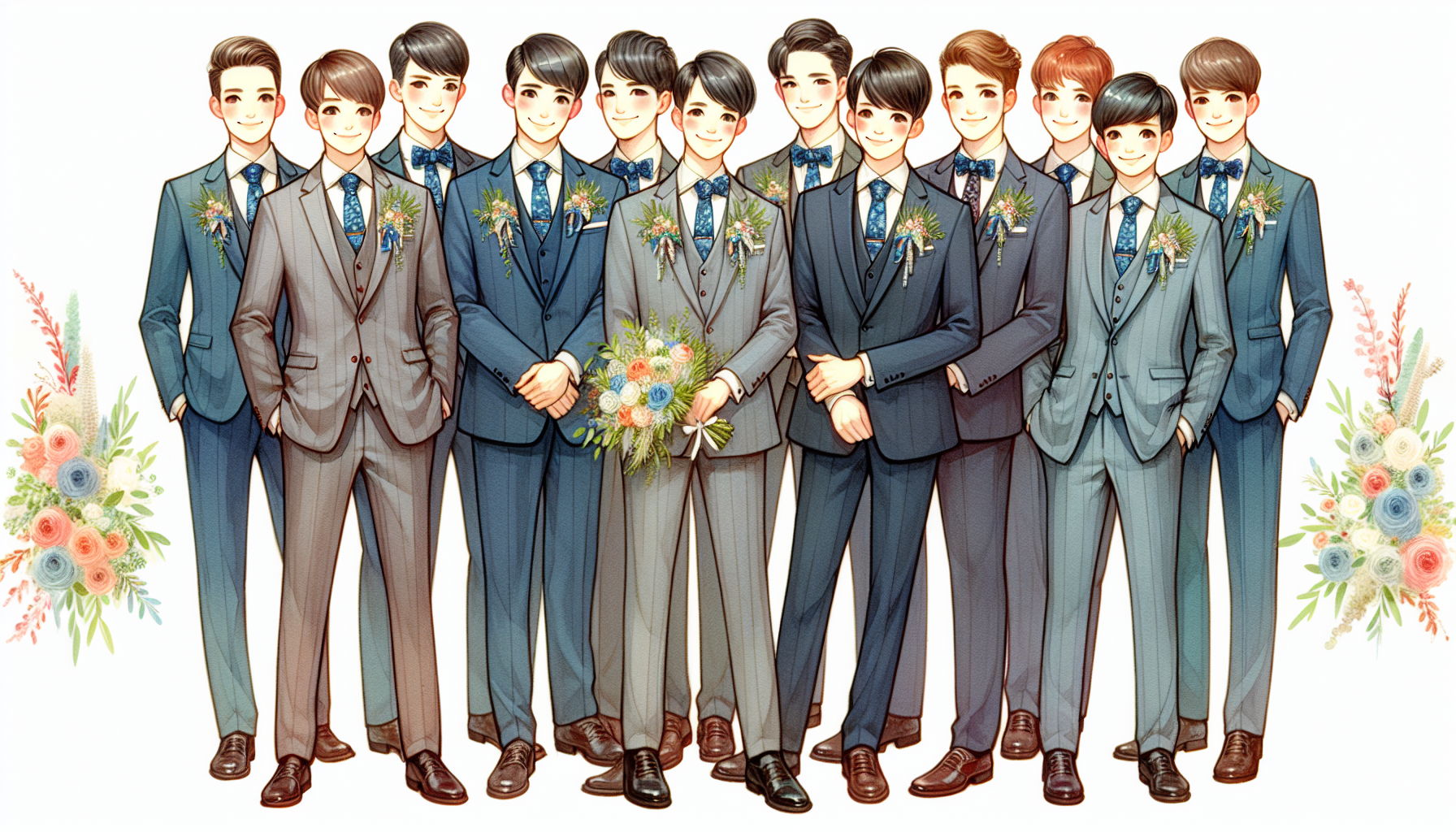
Ushers serve as visual representatives of your wedding theme, so their attire should match the aesthetic you’ve meticulously curated. Whether the vibe is formal or casual, what ushers wear plays a part in creating a cohesive look that complements the wedding party and adds to the overall beauty of the day.
Matching the Wedding Party
To achieve a unified front, ushers’ attire often mirrors that of the groom and best man, with slight variations to distinguish the groom from his entourage. In scenarios where the groomsmen are dressed to the nines in tuxedos, ushers might don suits but with matching ties and pocket squares to maintain stylistic consistency. The groom may even choose attire for ushers that nods to the bridesmaids’ colours, adding a touch of harmony between both sides of the aisle.
The key is to ensure ushers stand out from the guests while still looking like an integral part of the wedding party, regardless of whether their attire is identical or simply complementary.
Attire for Different Types of Weddings
The level of formality at your wedding will dictate the dress code for your ushers, including their choice of a wedding suit. At more relaxed celebrations, ushers might have the freedom to choose their own suits within a specified colour range, ensuring they still look presentable and part of the event.
For female ushers, coordinated dresses or trouser suits that set them apart from the bridesmaids are a stylish and inclusive option.
The Usher’s Toolkit: What Every Usher Needs to Know
Equipping ushers involves more than just a charming smile; they need a comprehensive knowledge toolkit, encompassing the ceremony timeline and the intricacies of guest relations. It’s about being prepared for anything, ensuring they can field any question or tackle any trouble with the confidence of someone who’s been part of the wedding party since day one.
Understanding the Ceremony Timeline
Knowing the ceremony timeline like the back of their hand is essential for ushers to effectively guide guests and manage the seating process. Familiarity with the schedule allows ushers to provide guests with accurate information, ensuring the ceremony flows without hitches or glitches. They must also be well-versed in the venue layout and any specific rules that guests should be aware of, like photography restrictions or confetti protocols.
Navigating Guest Queries and Concerns
The usher’s job extends beyond the physical layout of the ceremony; it includes being a knowledgeable point of contact for any and all guest queries. From providing directions to parking facilities to coordinating with local taxi firms for those without a ride, ushers are the go-to resource for guest concerns. They ensure accessibility for all guests, including those with wheelchairs, and keep handy the contact information for key people and services related to the wedding, such as the transport firm for the bride.
With an understanding of seating preferences and the tradition of the bride’s and groom’s families, ushers are equipped to address concerns efficiently and with grace.
Key Moments for Ushers During the Wedding Ceremony
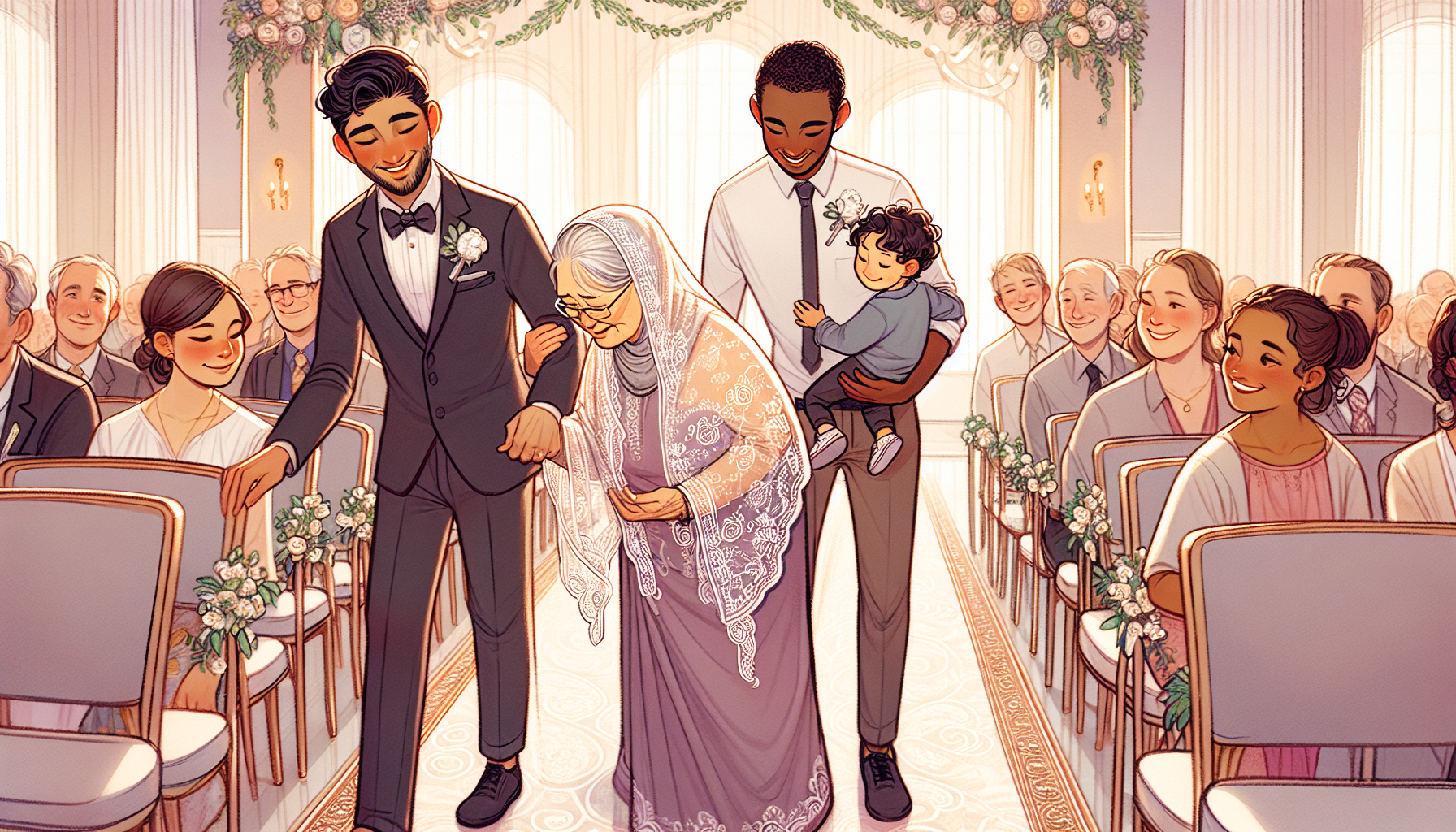
Key moments in the wedding ceremony depend on the ushers’ discreet yet decisive actions. They ensure each moment, from guest arrivals to the newlyweds’ grand exit, unfolds with grace and orderliness.
These pivotal points in the ceremony are where ushers truly demonstrate their worth, orchestrating the processional and maintaining the ceremonial flow with practised ease.
Escorting Family Members
Ushers take centre stage during the processional when they escort family members to their designated seats. The processional is a dance of respect where ushers guide grandparents and parents, ensuring the groom’s family sits on the right and the bride’s on the left. They ensure that immediate family members and special guests find solace in the front rows, reserved just for them.
This tradition is carried out with a level of reverence and attentiveness that honours the family’s role in the couple’s journey to the altar.
Assisting with the Aisle and Processional
As the ceremony begins, ushers assist with the aisle and processional, ensuring a seamless transition from prelude to pronouncement. They must navigate the space with discretion, often escorting multiple family members and returning by an alternate route to avoid drawing attention away from the bride’s entrance. It’s a ballet of movement and timing, one that ushers perform with the finesse of a seasoned conductor, all to the tune of the couple’s love story.
Summary
As the last echoes of celebration fade into the night, we look back on the day and appreciate the silent sentinels who made it all possible. Wedding ushers are the unsung heroes, the gracious guides, and the caretakers of comfort who ensure that every guest feels welcomed, every moment is honoured, and the wedding ceremony becomes a cherished memory for all. From the first greeting to the final goodbye, ushers help to create an atmosphere of love and organization that allows the bride and groom to bask in the joy of their union, worry-free.
Frequently Asked Questions
Who can serve as a wedding usher?
Wedding ushers can be anyone with a friendly demeanour, organizational skills, and a sense of responsibility, such as teenage siblings, neighbours, coworkers, or close friends. Just make sure they are reliable and personable.
How many ushers do I need for my wedding?
You would typically need one usher for every 50 wedding guests, but this can depend on the size of your guest list and the layout of your venue. Keep in mind the complexity of your wedding to determine the exact number of ushers needed.
What should ushers wear at the wedding?
Ushers should wear attire that matches the wedding party or follows the wedding’s colour scheme, ranging from formal suits to more relaxed options based on the wedding’s formality.
What are the primary duties of wedding ushers?
The primary duties of wedding ushers include greeting guests, guiding them to their seats, managing seating arrangements, handling late arrivals, and assisting with any unexpected situations that may arise during the wedding ceremony. Wedding ushers play a key role in ensuring the smooth flow of the event.
Can children be ushers at a wedding?
Yes, confident and outgoing older children can be chosen as ushers, and they often receive positive feedback for their enthusiasm at weddings.
My role
My usual role is to be there to assist and guide the Ushers. To help them in any way I can, to oversee, to ensure fluidity and conformality to your instructions. I use my experience to ensure they “shine” on the day and everything goes smoothly.

